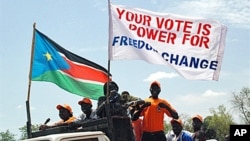With just 60 days left until Southern Sudan's independence vote, one of the major remaining obstacles is border demarcation. Officials in Northern Sudan have repeatedly said that the work must be done before the vote. The British government says it will help with drawing the border in what may soon be a divided Sudan.
Britain's Secretary of State for International Development, Andrew Mitchell, met with officials from the government of semi-autonomous Southern Sudan in Juba, where he also attended the opening of a British Embassy office.
After the ceremony in the European Union compound's gravel courtyard, Mitchell told reporters that Britain will assist with establishing a border between north and south.
"Britain is engaged in giving advice and support and some expert guidance at the request of both parties," he said.
Mitchell did not say when he expects border demarcation to be completed. The issue is complicated because there are many groups living near the border that migrate between north and south Sudan in search of water and grass for their cattle. Concerns have been raised that border demarcation and southern independence will cause serious disruptions to those seasonal movements.
The government in the north has repeatedly said demarcation must be done before a referendum on southern independence is held.
The British play an important role because they were the first to establish a border between north and south Sudan, in 1956. A 2006 commission was supposed to establish a border identical to the 1956 border.
Southern officials have said the British are in possession of maps and records that could speed up a process that has been slowed by political disagreements.
Mitchell said his meetings with Sudanese officials made him confident that both governments are committed to the terms of a 2005 peace deal, known as the CPA.
"It is clear that there is a head of steam amongst all the political leaders to stand by the CPA, understand that this is a difficult and tense moment and to work to ensure that the will of the people and the agreements set out in the CPA are both abided by," Mitchell said.
There is a long history between Sudan and the United Kingdom. The British first arrived in the country about 130 years ago. They were the colonial rulers of Sudan until independence in 1956. The British government has pledged more than $16 million to help with the referendum process in Sudan.












